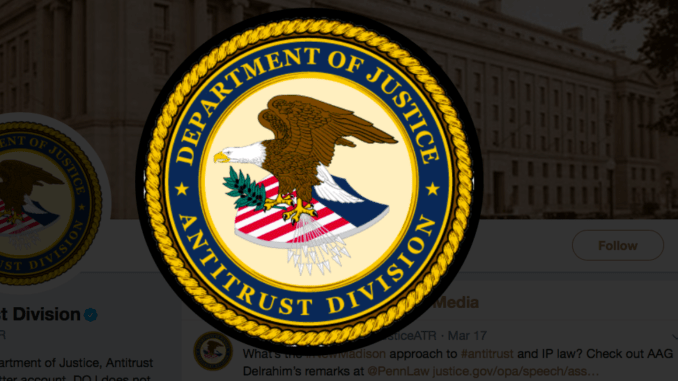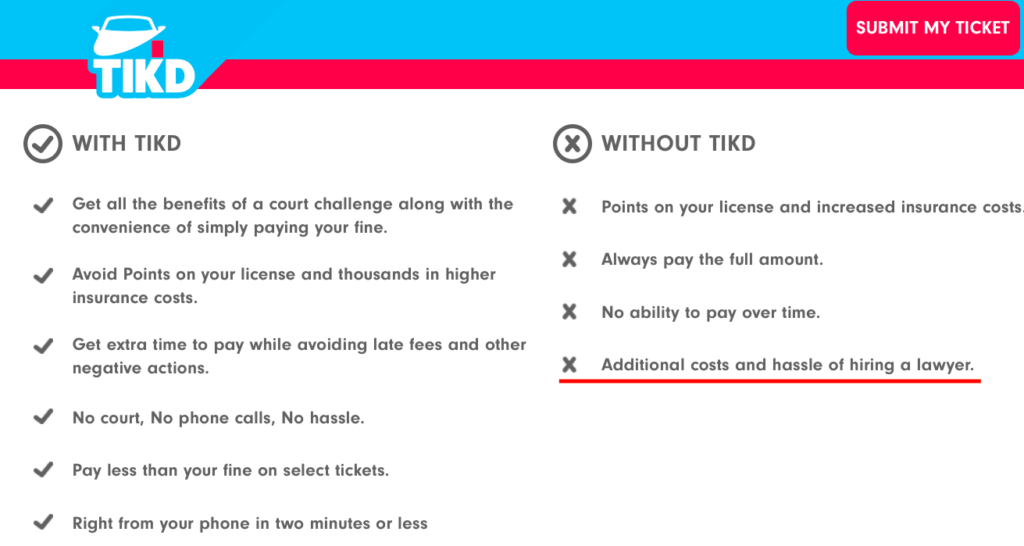
Here’s something Artificial Lawyer wasn’t expecting to write: the US Department of Justice Antitrust Division (DOJAD) are legal tech heroes and I salute them.
Why the salute? Here’s why.
A week or so ago a story broke on Reuters (see original link) that the DOJAD had entered a written submission into the middle of a court case between the Florida Bar and a tech company that had made an app to help speed up the resolution of traffic tickets, which included pairing citizens with local lawyers and cutting the costs of the entire legal process.
The legal specifics of the case become surprising complex, but centre around one single key point: do lawyers have a right to prevent competition? (And one might add, do they have a right to prevent competition that is driven by legal tech?)
The submission of a ‘Statement of Interest‘ by the DOJAD states: ‘TIKD [which is the tech company] alleges that the Florida Bar, several Bar officers, and The Ticket Clinic defendants conspired to eliminate TIKD as a competitor by waging a misinformation campaign to scare away lawyers who work with TIKD.’
The DOJAD continues that the claim states that ‘…the [alleged] misinformation consisted of giving the false impression that working with TIKD would violate Florida ethical rules and that the Bar already had determined that TIKD [allegedly] engages in the unlicensed practice of law (UPL).’
Or in short, a tech company that sought to help society address a basic legal issue, i.e. resolving traffic tickets quickly and easily, was – it would appear – intimidated by the lawyers whose job it is to help society to access justice and solve these exact same issues.
But, now to the central point. The regulatory book was not just thrown by lawyers in general at the offending competitor, it was thrown by the lawyers who were also regulating the lawyers, i.e. the Bar. The ‘judge and jury’ in this matter were cut from the same cloth and wanted the same thing, it would appear.
The case then enters some intricate legal arguments around whether a State Bar can behave as if it is a branch of Government or not, especially when it comes to preventing competition. The point here is that if a group of lawyers who are basically making their own rules to protect their own backsides can pass themselves off as representing the Government’s own will and by extension the will of the people, then…well….then we end up where we are today in many countries. I.e. the illusion that democracies want to stifle competition in the legal sector, which I am guessing is not actually the case at all.

OK, you may say. What does this have to do with technology? Well, check out the following comments made by the DOJAD in their submission. And it is for these reasons they are legal tech heroes and their comments are worth repeating verbatim and at length.
‘Courts have long recognised that vigorous competition is a crucial factor that fuels innovation,’ argue the DOJAD team.
‘…[and] technological innovations often have enormous pro-competitive benefits. This reinforcing cycle of competition and innovation generates “dynamic efficiency” in the marketplace, which ultimately allows consumers to reap the rewards of new and exciting products,’ they add.
And then comes the zinger: ‘Business models entrenched for decades have witnessed new competition from mobile platforms that can profoundly change an industry. But almost invariably, the winners from the process of innovation and competition are consumers.’
If you replace the words ‘mobile platforms’ with the words ‘legal tech’, and one could argue that the TIKD app is legal tech, then you have a beautifully expressed statement of fact.
The point about competition is also crucial. While it’s true that law firms compete with each other, especially for the top deals with the largest clients, they are not really competing (yet) sufficiently with other legal businesses that are radically different. I.e. this isn’t a real competition. That is to say, you can choose anything you want, but most options are the same.
The Big Four, LPOs and ALSPs are making good progress, but they’re not scaring Big Law sufficiently yet. So, we have a group of people who all have the same business model, offering the public and shareholders of companies little real choice, who are also regulating themselves….and, who are also jumping on the heads of those who they see as a threat, in this case a legal tech company.
Usually what happens in these situations is that the incumbents, with their tight relationships to key institutions get the decision they want and life carries on as ‘normal’. But, in this case the DOJAD stepped in and dropped a little reminder on the legal world’s head that they are not untouchable.
Let’s round off this missive with a quote from a previous case that the DOJAD clearly took a liking to, as they mentioned it in their submission. It is from United States v. Topco Associates, 405 U.S. 596, 610 (1972) and it says:
‘Antitrust laws in general…are the Magna Carta of free enterprise. They are as important to the preservation of economic freedom and our free-enterprise system as the Bill of Rights is to the protection of our fundamental personal freedoms.’
And the fact that, quite understandably the DOJ is populated by lawyers, makes this all so much better. As with all professions, there are those who actively welcome change and competition, whether via the route of technology or not, and those that do not. So, it’s very heartening to see the DOJ coming out in favour of competition in the legal world (or at least that’s my interpretation of what they said.)
It would be great to also look at the potential for the DOJ to intervene in the ABA debate about non-lawyer ownership of law firms and other deregulation issues. But, those will have to wait for another day. That said, intervention from outside the usual forums of lawyers debating what is good for lawyers, may be the only way things change.
—
[N.B. It’s worth mentioning that in England & Wales, the regulatory oversight function for solicitors has been separated from the representative body, the Law Society. In part this was to make sure solicitors didn’t disappear up the tunnel of their own regulatory contradiction. And, for readers who are not familiar with the US system, although the American Bar Association is a very important representative body, it has no actual power to regulate lawyers at a State level, which remains with the local Bar organisations and the State courts.]
